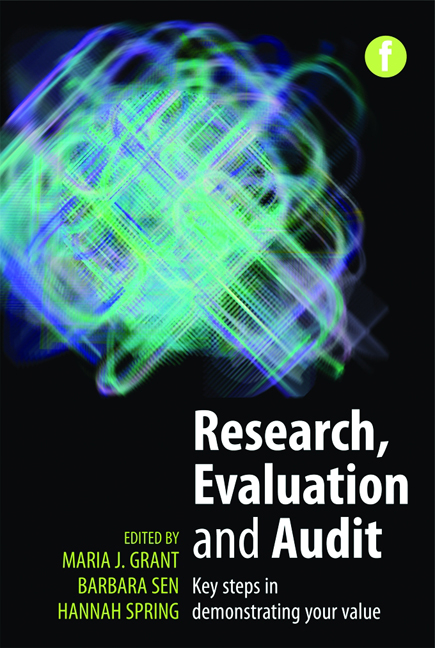Book contents
- Frontmatter
- Contents
- About the Editors
- Contributor
- Foreword
- Preface
- PART 1 GETTING STARTED
- 1 What are research, evaluation and audit?
- 2 Building confidence
- 3 Asking the right question
- 4 Writing your project plan
- 5 Ethics and best practice
- PART 2 DOING RESEARCH, EVALUATION AND AUDIT
- PART 3 IMPACT OF RESEARCH, EVALUATION AND AUDIT
- Closing remarks
- Index
3 - Asking the right question
from PART 1 - GETTING STARTED
Published online by Cambridge University Press: 08 June 2018
- Frontmatter
- Contents
- About the Editors
- Contributor
- Foreword
- Preface
- PART 1 GETTING STARTED
- 1 What are research, evaluation and audit?
- 2 Building confidence
- 3 Asking the right question
- 4 Writing your project plan
- 5 Ethics and best practice
- PART 2 DOING RESEARCH, EVALUATION AND AUDIT
- PART 3 IMPACT OF RESEARCH, EVALUATION AND AUDIT
- Closing remarks
- Index
Summary
‘Where do project ideas come from?’
‘What makes a good research question?’
‘Should I work in collaboration with other researchers?’
Most researchers would acknowledge that knowing how to begin can be the hardest part. However, Fourie (2012) urges every library and information science (LIS) practitioner to play their part in contributing to the evidence base that so directly informs decisionmaking, while Lerdal (2006) suggests that we can positively affect the future of our profession by building up a bank of professional knowledge which can be applied to our daily practice.
There is no defined place to begin the process of generating your research question, which can instead be viewed as an iterative and cyclical process (Beck and Manuel, 2008) or, as Blaxter, Hughes and Tight (2006) refer to the research process, a research spiral. Both approaches indicate that research is a neverending process that can be entered at almost any point, and so finding a research idea that interests you is a good first step and, as Beck and Manuel suggest, can be a key determinant in the later success of a project. This chapter provides guidance through those first essential stages of generating ideas and formulating research questions.
What makes a good research question?
The key to a strong piece of research is a question that is answerable, well built and focused (Lerdal, 2006). Your question will be the foundation on which the search strategy, methodology (see Chapters 7 and 8), literaturereview (see Chapter 6) and ultimately the conclusion is built upon. Research questions should be clearly defined (Bryman, 2008) and answerable. This may sound simple and obvious but compare the approach of formulating a research statement versus a research question. Your research statement might be ‘Young people's impressions of librarianship as a career’. However, changing it to pose it as a question will help ensure that it is tightly and accurately defined (Boden, Kenway and Epstein, 2005, 30), for example, ‘What impressions do young people have of librarianship as a career?’
- Type
- Chapter
- Information
- Research, Evaluation and AuditKey steps in demonstrating your value, pp. 31 - 44Publisher: FacetPrint publication year: 2013



